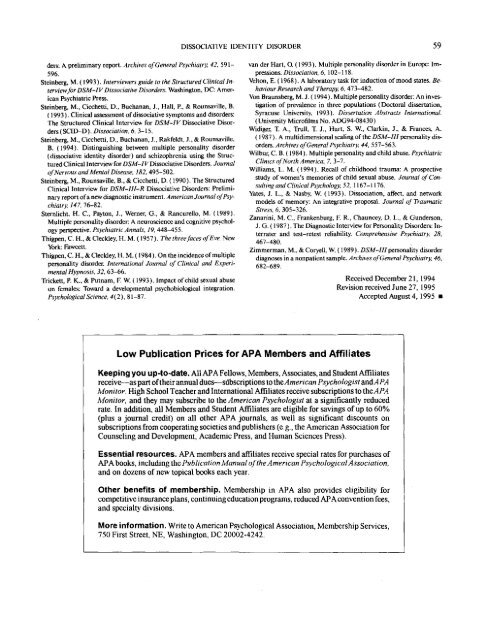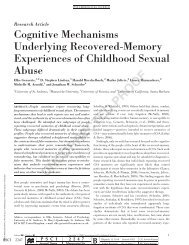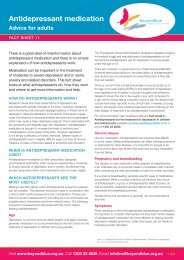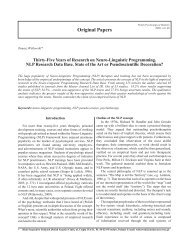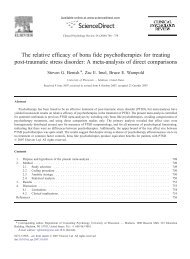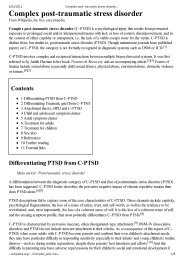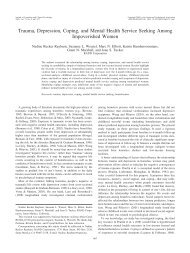The Sociocognitive Model of Dissociative Identity Disorder: A ...
The Sociocognitive Model of Dissociative Identity Disorder: A ...
The Sociocognitive Model of Dissociative Identity Disorder: A ...
You also want an ePaper? Increase the reach of your titles
YUMPU automatically turns print PDFs into web optimized ePapers that Google loves.
DISSOCIATIVE IDENTITY DISORDER 59<br />
ders: A preliminary report. Archives <strong>of</strong> General Psychiatry. 42, 591-<br />
596.<br />
Steinberg, M. (1993). Interviewers guide lo the Structured Clinical Interviewfor<br />
DSM-IY <strong>Dissociative</strong> <strong>Disorder</strong>s. Washington, DC: American<br />
Psychiatric Press.<br />
Steinberg, M,, Cicchetti, D., Buchanan, J., Hall, P., & Rounsaville, B.<br />
f 1993). Clinical assessment <strong>of</strong> dissociative symptoms and disorders:<br />
<strong>The</strong> Structured Clinical Interview for DSM-IV <strong>Dissociative</strong> <strong>Disorder</strong>s<br />
(SCID-D). Dissociation, 6, 3-15.<br />
Steinberg, M., Cicchetti, D., Buchanan, J., Rakfeldt, J., & Rounsaville,<br />
B. (1994). Distinguishing between multiple personality disorder<br />
(dissociative identity disorder) and schizophrenia using the Structured<br />
Clinical Interview for DSM-IV <strong>Dissociative</strong> <strong>Disorder</strong>s. Journal<br />
<strong>of</strong> Nervous and Menial Disease, 182, 495-502.<br />
Steinberg, M., Rounsaville, B., & Cicchetti, D. (1990). <strong>The</strong> Structured<br />
Clinical Interview for DSM-III-R <strong>Dissociative</strong> <strong>Disorder</strong>s: Preliminary<br />
report <strong>of</strong> a new diagnostic instrument. American Journal <strong>of</strong> Psychiatry,<br />
147, 76-82.<br />
Sternlicht, H. C, Payton, J., Werner, G., & Rancurello, M. (1989).<br />
Multiple personality disorder: A neuroscience and cognitive psychology<br />
perspective. Psychiatric Annals, 19, 448-455.<br />
Thigpen, C. H., & Cleckley, H. M. (1957). <strong>The</strong> three faces <strong>of</strong> Eve. New<br />
%rk: Fawcett.<br />
Thigpen, C. H., & Cleckley, H. M. (1984). On the incidence <strong>of</strong> multiple<br />
personality disorder. International Journal <strong>of</strong> Clinical and Experimental<br />
Hypnosis, 32, 63-66.<br />
Trickett, P. K., & Putnam, F. W. (1993). Impact <strong>of</strong> child sexual abuse<br />
on females: Toward a developmental psychobiological integration.<br />
Psychological Science. 4(2), 81-87.<br />
van der Hart, O. (1993). Multiple personality disorder in Europe: Impressions.<br />
Dissociation, 6, 102-118.<br />
Velton, E. (1968). A laboratory task for induction <strong>of</strong> mood states. Behaviour<br />
Research and <strong>The</strong>rapy, 6, 473-482.<br />
Von Braunsberg, M. J. (1994). Multiple personality disorder: An investigation<br />
<strong>of</strong> prevalence in three populations (Doctoral dissertation,<br />
Syracuse University, 1993). Dissertation Abstracts International.<br />
(University Micr<strong>of</strong>ilms No. ADG94-08430)<br />
Widiger, T. A., Trull, T. J., Hurt, S. W., Clarkin, J., & Frances, A.<br />
( 1987). A multidimensional scaling <strong>of</strong> the DSM-III personality disorders.<br />
Archives <strong>of</strong> General Psychiatry, 44, 557-563.<br />
Wilbur, C. B. (1984). Multiple personality and child abuse. Psychiatric<br />
Clinics <strong>of</strong> 'North America, 7, 3-7.<br />
Williams, L. M. (1994). Recall <strong>of</strong> childhood trauma: A prospective<br />
study <strong>of</strong> women's memories <strong>of</strong> child sexual abuse. Journal <strong>of</strong> Consulting<br />
and Clinical Psychology, 52, 1167-1176.<br />
Yates, J. L., & Nasby, W. (1993). Dissociation, affect, and network<br />
models <strong>of</strong> memory: An integrative proposal. Journal <strong>of</strong> Traumatic<br />
Stress, 6, 305-326.<br />
Zanarini, M. C., Frankenburg, F. R., Chauncey, D. L., & Gunderson,<br />
J. G. (1987). <strong>The</strong> Diagnostic Interview for Personality <strong>Disorder</strong>s: Interrater<br />
and test-retest reliability. Comprehensive Psychiatry, 28,<br />
467-480.<br />
Zimmerman, M., & Coryell, W, (1989). DSM-III personality disorder<br />
diagnoses in a nonpatient sample. Archives <strong>of</strong> General Psychiatry, 46,<br />
682-689.<br />
Received December 21, 1994<br />
Revision received June 27, 1995<br />
Accepted August 4, 1995 •<br />
Low Publication Prices for APA Members and Affiliates<br />
Keeping you up-to-date. All APA Fellows, Members, Associates, and Student Affiliates<br />
receive—as part <strong>of</strong> their annual dues—subscriptions to \\\&American Psychologist anAAPA<br />
Monitor. High School Teacher and International Affiliates receive subscriptions to iheAPA.<br />
Monitor, and they may subscribe to the American Psychologist at a significantly reduced<br />
rate. In addition, all Members and Student Affiliates are eligible for savings <strong>of</strong> up to 60%<br />
(plus a journal credit) on all other APA journals, as well as significant discounts on<br />
subscriptions from cooperating societies and publishers (eg., the American Association for<br />
Counseling and Development, Academic Press, and Human Sciences Press).<br />
Essential resources. APA members and affiliates receive special rates for purchases <strong>of</strong><br />
APA books, including the Publication Manual <strong>of</strong> the American Psychological Association,<br />
and on dozens <strong>of</strong> new topical books each year.<br />
Other benefits <strong>of</strong> membership. Membership in APA also provides eligibility for<br />
competitive insurance plans, continuing education programs, reduced APA convention fees,<br />
and specialty divisions.<br />
More information. Write to American Psychological Association, Membership Services,<br />
750 First Street, ME, Washington, DC 20002-4242.


